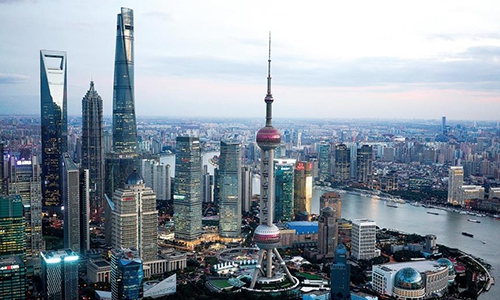HOME >> SOURCE
2020 Outlook: No need for pessimism
By Liu Yuanchun Source:Global Times Published: 2019/12/30 18:53:05

File photo
China's economic slowdown in 2019 was mainly caused by the superposition of trends, cyclical factors and sudden events. Despite some of the causes that still exist in 2020, the economic outlook is not necessarily pessimistic as some cyclical factors will reverse and good results of reform will continue to show up.Among the major trend factors, the institutional factor has bottomed out. Its reform measures have promoted the improvement of the Total Factor Productivity (TFP), although it's still not strong enough to reverse the overall economic slowdown trend. From 2017 to 2018, TFP growth has picked up and made a bigger contribution to overall economic growth.
The China-US trade war has caused severe impacts on economic globalization, but even before the trade war, the globalization has encountered difficulties. Goods and services trade's contribution to China's GDP growth had shrunk from the peak of 8.6 percent in 2007 to 0.8 percent in 2018. The trade war has accelerated the process, and the interim progress in trade talks is improving the condition.
The dividend of industrialization is shrinking. The manufacturing industry's proportion continues to shrink. Since 2008, the industry's contribution to GDP has fallen from 41.3 percent to 33.9 percent in 2018. The number has fallen to 33.5 percent in the first three quarters of 2019. However, the tertiary sector of the economy had exceeded the industrial sector for the first time in 2008, reaching 54 percent in the first three quarters of 2019.
Among the cyclical factors, the alleviation of financial risks and the China-US trade tensions provide a relatively stable financial outlook and trade environment in the next year, which will boost the market confidence.
However, it should be realized that challenges still remain and counter-cyclical measures should continue to be the policy focus in next stage.
Constrained by factors such as declining investment income expectations, weak confidence, and investment space constraints, private investment is unable to follow up with state-owned investment in a timely manner to get out of the dilemma of operating at the bottom of the cycle.
Consumption continued to decline due to factors such as declining income growth, the reversal of the pig cycle, and the bottom of the automobile cycle.
Under the influence of the anti-globalization movement and the spread of international conflicts, global uncertainties have risen sharply, international trade growth has slowed down, and global demand for durable goods and investment goods has shrunk significantly, thus leading to a full restart of the world's economic downturn.
The bruising trade war and pork rally were the biggest black swan events that have impacted China's economy in 2019. The high uncertainty during the China-US trade talks has weakened market players' confidence and dragged down investments.
The surge in pork prices has not only had a significant impact on household consumption and consumption expectations, but also significantly interfered with macroeconomic policy regulation, which is one of the core reasons for the accelerated decline in China's consumption growth.
In general, the institutional dividend of the Chinese economy has begun to rebound. The recent mitigation of financial risks and the interim progress of the China-US trade talks will bring a relatively stable financial market environment and foreign trade environment for the upcoming year. This provides a very favorable point in time for rebuilding market confidence. In fact, confidence has been restored since the fourth quarter. To maintain this positive momentum, the spirit and blueprint of the Fourth Plenary Session of the 19th CPC Central Committee needs to be detailed and implemented as planned.
The author is vice president of Renmin University of China. bizopinion@globaltimes.com.cn
Posted in: EXPERT ASSESSMENT